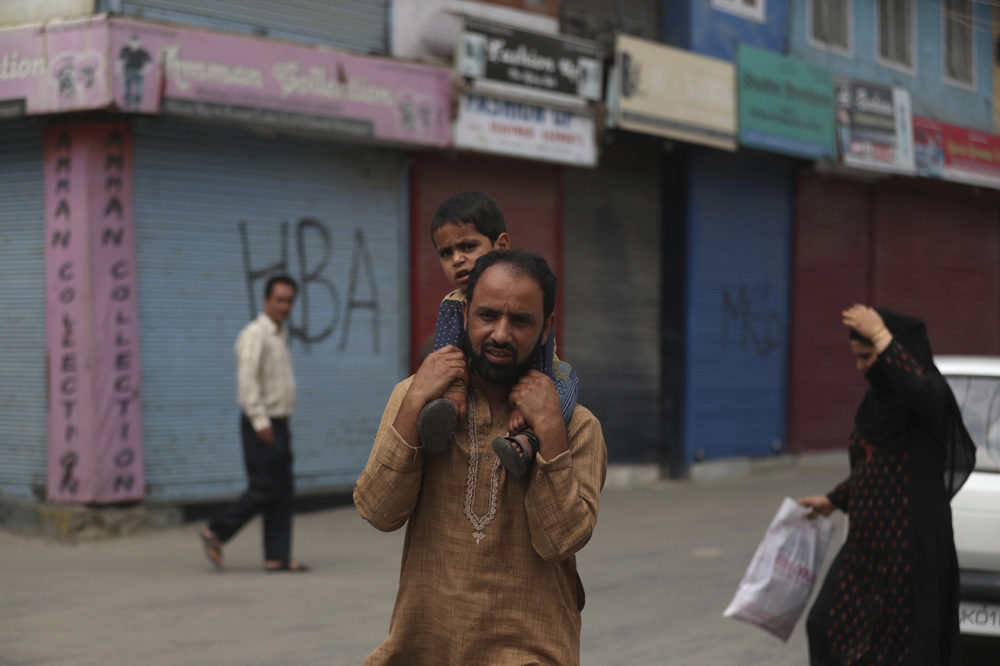Advertisement
India, Pakistan And The Latest On The Lockdown In Kashmir
Resume
With Meghna Chakrabarti
India revokes Kashmir’s special status. Pakistan moves troops close to the Line of Control. Are the two nuclear powers again on the brink of war?
Guests
Adil Najam, dean of Boston University's Frederick G. Pardee School of Global Studies. Former vice chancellor of the Lahore University of Management Sciences in Lahore, Pakistan. (@adilnajam)
Ravi Agrawal, managing editor at Foreign Policy and co-author of its South Asia Brief newsletter. Former CNN bureau chief in New Delhi. Author of "India Connected: How the Smartphone Is Transforming the World's Largest Democracy." (@RaviReports)
From The Reading List
Washington Post: "Among the 3,000 detained by Indian authorities in Kashmir: Children" — "Dusk was falling as the three boys walked home from the neighborhood mosque.
"Farhan Farooq, a skinny 13-year-old with a tuft of black hair, was the youngest. Suddenly, a police vehicle came to a stop next to them and armed officers jumped out in the August twilight. They bundled the three friends into the car, one of the other boys recalled later. Farhan began to cry.
"For the next week, Farhan’s family said, he was held in a jail cell at the local police station in this Kashmiri town 10 miles outside of Srinagar, part of a sweeping crackdown by Indian authorities in the wake of the government’s decision to strip Kashmir of its autonomy and statehood.
"Farhan is among some 3,000 people detained in Kashmir since Aug. 5, according to an estimate from a senior local government official who spoke on the condition of anonymity because he was not authorized to discuss the matter. It is unclear how many of the detainees were minors, but The Washington Post has confirmed that at least five Kashmiris younger than 18 have been taken into detention since the start of the crackdown."
Al Jazeera: "Chaos and crisis in Kashmir hospitals after month-long lockdown" — "For the past two weeks, Mohamad Shafi has been at the bedside of his 13-year-old son Rafi, who has been admitted to the nephrology ward of a state-run hospital in Indian-administered Kashmir's main city of Srinagar.
"Shafi is tired and has hardly had much sleep, but the 54-year-old is prepared to stay at the Sher-i-Kashmir Institute of Medical Science (SKIMS) hospital for as long as it takes.
"Rafi suffers from a chronic kidney ailment and needs dialysis every 15 days, a medical procedure that cannot be done at his village in Tangdar area of Kupwara, a frontier district some 100 kilometres northwest of Srinagar.
"Kupwara is close to the Line of Control (LoC), the de facto border that divides the disputed Kashmir territory between India and Pakistan.
"The military lockdown and communications blackout imposed by the Indian government following the revocation of the region's autonomy last month has crippled life in the Muslim-majority Kashmir region."
Reuters: "Pakistan vows 'fullest possible response' to India over Kashmir" — "Pakistan will make the fullest possible response to India’s actions in disputed Kashmir and the global community would be responsible for any 'catastrophic' aftermath, Imran Khan, the prime minister of the Muslim-majority nation, said on Friday.
"The rhetoric on the annual Defence Day remembrance of Pakistan’s fighters in a 1965 war with India underscores rising tension between the nuclear-armed foes after New Delhi last month revoked the autonomy of its part of disputed Kashmir.
"'I have informed the world that Pakistan does not want war, but at the same time, Pakistan cannot remain oblivious to the challenges posed to its security and integrity,' Khan said in a statement on the website of state-run Radio Pakistan.
"'We are prepared to give the enemy the fullest possible response. Failing, the world community will be responsible for the catastrophic aftermath,' he added."
Stefano Kotsonis produced this hour for broadcast.
This program aired on September 9, 2019.